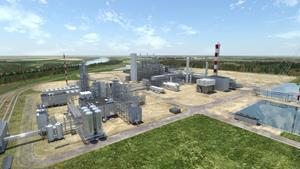Inter Pipeline to build Canada’s first integrated PDH, PP complex
CALGARY, Alberta — Inter Pipeline Ltd. announced that its board of directors has authorized the construction of a world-scale integrated propane dehydrogenation (PDH) and polypropylene (PP) plant. The facilities, collectively referred to as the Heartland Petrochemical Complex, are estimated to cost $3.5 B in aggregate and will be located in Strathcona County, Alberta near Inter Pipeline’s Redwater Olefinic Fractionator.
The Heartland Petrochemical Complex will be designed to convert locally sourced, low-cost propane into 525 Mtpy of polypropylene, a high value, easy to transport plastic used in the manufacturing of a wide range of finished products. Construction of the complex will continue in early 2018 with completion scheduled for late 2021.
The PDH facility will be designed to convert approximately 22,000 bpd of propane into 525 Mtpy of polymer grade propylene. Propane feedstock for the PDH plant will be sourced from Inter Pipeline’s Redwater Olefinic Fractionator as well as several other third-party fractionators in the region.
Detailed engineering for the plant was awarded to Fluor Corporation in 2013 and is now approximately 85 percent complete. Inter Pipeline has also completed early civil work at the site in preparation for facility construction activities in early 2018.
The integrated PP plant will utilize propylene from the PDH plant to produce 525 Mt of polypropylene per year. Linde Engineering was awarded the front-end engineering design contract for this facility in 2017, and work is currently approximately 70% complete. Construction of this component of the complex is scheduled to begin in the second half of 2018.
Other construction activities associated with the project include product storage facilities and rail loading assets to facilitate the transport of polypropylene pellets to various North American markets.
Inter Pipeline is conducting a two phase contracting process to underpin this investment. Phase 1, which has been completed, resulted in Inter Pipeline securing certain take-or-pay contracts with an average term of 9 yr. Phase 2 contracting will commence in early 2018 with the objective of securing between 70% and 85% of total petrochemical processing capacity under take-or-pay contracts over the next 4 yr.
Inter Pipeline intends to utilize the remaining uncontracted plant processing capacity for its own commercial purposes.
The take-or-pay agreements are structured to provide a fixed return on capital payment to Inter Pipeline, plus a recovery of variable and fixed operating and transportation costs. Inter Pipeline has no exposure to propane or polypropylene commodity price fluctuations under these agreements.
When contracting is complete and the complex is in operation, Inter Pipeline expects to earn approximately $450 MM to $500 MM per year in long-term average annual EBITDA. This represents a strong return on invested capital and is expected to be accretive to forecast funds from operations per share.
Inter Pipeline will also benefit from $200 MM of royalty credits received from the Government of Alberta’s Petrochemical Diversification Program. The credits were provided in support of the construction of the propane dehydrogenation plant and will be monetized over a three-year period once the complex is operational.
Funding for this petrochemical facility is expected to be provided through a combination of debt and equity financing sources. At present, Inter Pipeline's financial position is supported by a strong balance sheet, investment grade credit ratings and excellent access to capital markets.
Inter Pipeline anticipates that capital commitments over the next four years will be met through a combination of capacity available under an existing $1.5 B committed credit facility, undistributed cash flow from operations, the periodic issuance of new term debt, hybrid debt securities and proceeds from existing dividend re-investment programs. Inter Pipeline does not expect the need for material, underwritten equity offerings to finance its funding obligations.







Comments